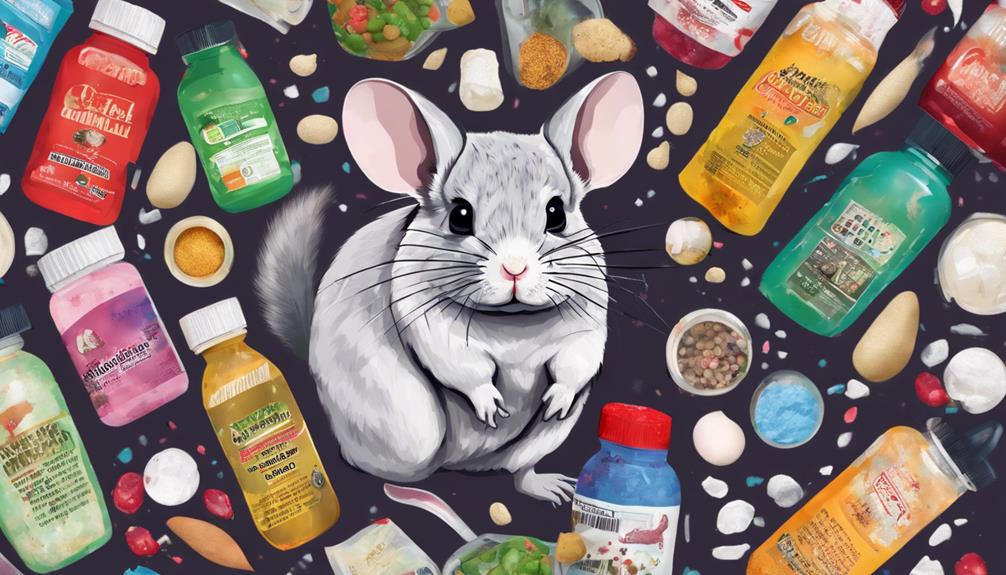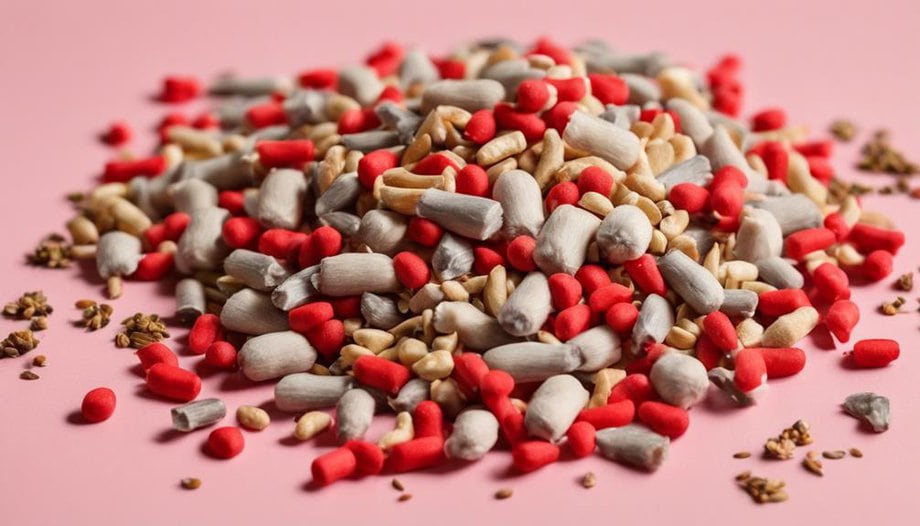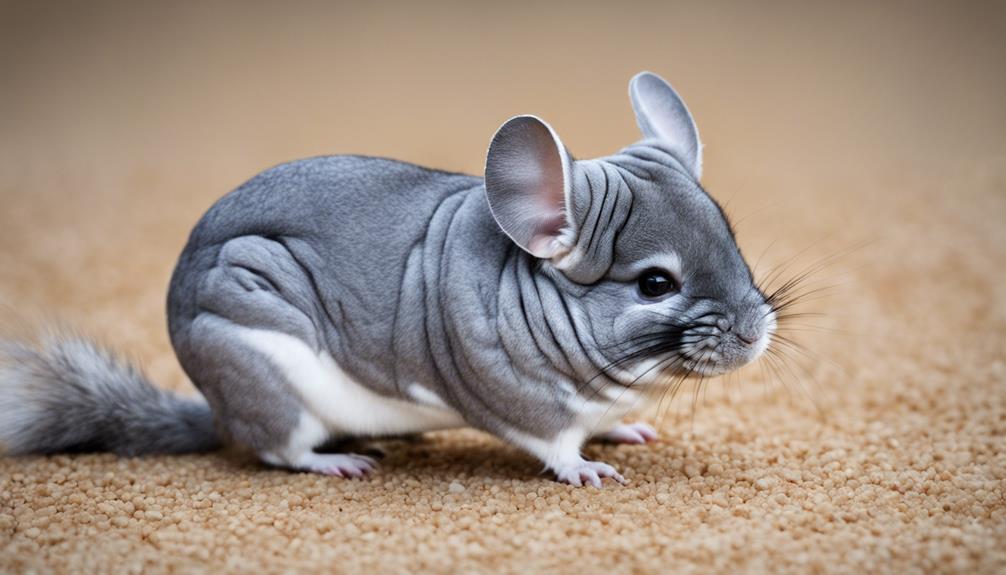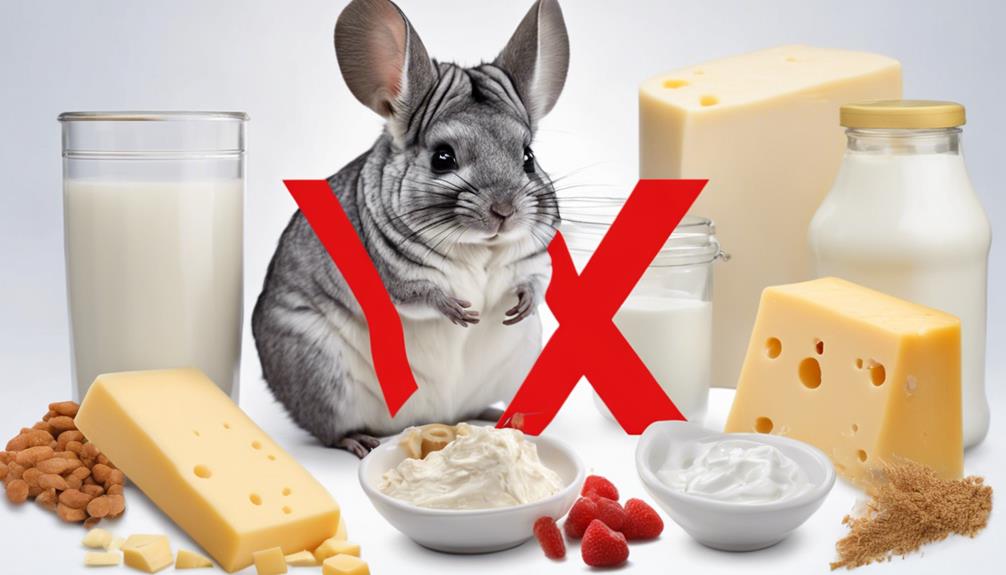What Ingredients to Avoid in Chinchilla Pellets and Treats

Ingredients to Avoid in Chinchilla Pellets and Treats:
- High sugar content
- Artificial colors and flavors
- Nuts and seeds
- Preservatives and additives
High Sugar Content
To prevent health issues in your chinchilla, avoid chinchilla pellets and treats with high sugar content. When it comes to your furry friend’s dental health and digestive system, sugar can wreak havoc if consumed in excess.
Chinchillas have teeth that continuously grow, and a high-sugar diet can lead to dental problems such as overgrowth or uneven wear, causing discomfort and difficulty in eating. Additionally, excessive sugar intake can disrupt your chinchilla’s digestive system, leading to issues like diarrhea or bloating.
Artificial Colors and Flavors
Steer clear of chinchilla pellets and treats that contain artificial colors and flavors as they may pose health risks to your furry companion. While these additives may make the food visually appealing to you, they don’t provide any assurance benefits to your chinchilla. Artificial colors and flavors are often used to mask low-quality ingredients or to enhance the taste of the food. However, they offer no real health implications for your pet and can even lead to digestive issues or allergic reactions.
When choosing chinchilla pellets and treats, opt for products that are free from artificial colors and flavors. Your chinchilla’s well-being should be the top priority, and providing them with natural, wholesome ingredients is the best way to ensure their health and happiness. Look for products that focus on essential nutrients and vitamins that support your chinchilla’s overall health. By avoiding artificial additives, you can help your furry friend thrive and live a long, healthy life.
Nuts and Seeds

When selecting chinchilla pellets and treats, be cautious about nuts and seeds due to their high fat content. These ingredients pose a risk of being a choking hazard to your pet.
Additionally, nuts and seeds can lead to dental health concerns for your chinchilla.
High Fat Content
With their high-fat content, nuts and seeds can be detrimental to your chinchilla’s health if consumed in excess. These ingredients, although rich in protein sources and fiber content, should be given sparingly due to their potential to cause obesity and digestive issues in chinchillas.
Excessive fat intake can lead to health problems such as liver disease and obesity in these small animals. When offering treats containing nuts or seeds, make sure they’re low in fat content to prevent any adverse effects on your chinchilla’s well-being.
Moderation is key when introducing high-fat foods like nuts and seeds into your chinchilla’s diet to maintain their overall health and essentiality.
Choking Hazard Risk
Excessive consumption of nuts and seeds by your chinchilla poses a choking hazard risk due to their small size and potential to cause blockages in the digestive tract. Chinchillas have specific pellet size and texture preferences to guarantee safe consumption.
Nuts and seeds, being small and hard, can easily be inhaled or swallowed whole, leading to choking incidents or digestive issues. Chinchillas lack the ability to vomit, making blockages particularly dangerous.
When selecting pellets and treats for your pet, opt for options that are larger in size and have a softer texture to reduce the risk of choking. Prioritizing your chinchilla’s safety by avoiding nuts and seeds can help maintain their well-being and prevent potential health complications.
Dental Health Concerns
To guarantee top dental health for your chinchilla, carefully consider the impact of nuts and seeds in their diet. These ingredients, while tasty, can pose risks to your pet’s dental hygiene. Here’s why:
- Hard Texture: Nuts and seeds can be hard, leading to potential damage to your chinchilla’s teeth.
- High Fat Content: Excessive fats in nuts and seeds may contribute to dental issues if consumed in large quantities.
- Difficulty Chewing: Chinchillas may struggle to chew nuts and seeds properly, affecting their dental health over time.
Preservatives and Additives

Utilizing chinchilla pellets and treats that are free of chemical preservatives, artificial colors, harmful additives, and unnecessary fillers guarantees a healthier diet for your furry companion. When selecting chinchilla food products, it’s critical to prioritize natural ingredients over artificial additives to guarantee the well-being of your pet.
Chemical preservatives like BHA, BHT, and ethoxyquin can be harmful to chinchillas, potentially causing health issues in the long run. Similarly, artificial colors add no nutritional value and may lead to adverse reactions in sensitive chinchillas. Opting for preservative-free and additive-free options minimizes the risk of exposing your pet to unnecessary chemicals.
Harmful additives and unnecessary fillers in chinchilla pellets and treats can disrupt your pet’s digestive system and overall health. These ingredients offer little to no nutritional benefit and may even contribute to obesity or other health complications. By choosing products that are free from such additives, you’re taking a proactive step towards promoting your chinchilla’s well-being and longevity.
High-Fat Ingredients
When selecting chinchilla pellets and treats, prioritize ingredients low in fat content to maintain your pet’s prime health and well-being. High-fat ingredients can lead to obesity risks and disrupt the nutritional balance necessary for your chinchilla’s digestive health.
To vital health for your furry friend, consider the following:
- Nutritional Balance: Opt for chinchilla pellets and treats that provide a well-rounded nutritional profile without excessive fat content. This will support your chinchilla’s overall health and vitality.
- Obesity Risk: High-fat ingredients can contribute to obesity in chinchillas, leading to various health issues. Choosing low-fat options can help mitigate this risk and keep your pet at a healthy weight.
- Protein Sources: Instead of high-fat ingredients, focus on treats and pellets that contain quality protein sources. Protein is essential for your chinchilla’s muscle development and overall well-being. Look for ingredients like timothy hay, alfalfa, or specific chinchilla-safe fruits and vegetables to provide the necessary nutrients without excess fat.
Dairy Products

Consider steering clear of dairy products when selecting chinchilla pellets and treats to uphold your pet’s peak health and nutrition. Chinchillas are lactose intolerant, which means dairy products can lead to digestive issues like diarrhea and bloating. Opting for dairy-free alternatives guarantees your chinchilla’s digestive system remains balanced and healthy.
While dairy products are a common source of calcium, there are other options better suited for chinchillas. Providing calcium is essential for maintaining strong bones and teeth in your pet. Look for chinchilla pellets and treats that contain calcium sources specifically formulated for these small herbivores. Vegetables like kale, broccoli, and parsley can offer natural calcium without the risks associated with dairy.
Processed Grains
Processed grains, commonly found in chinchilla pellets and treats, may not provide ideal nutrition for your pet due to their lower nutrient content compared to whole grains. When considering your chinchilla’s well-being, it’s important to understand the impact of processed grains on their health.
- Nutrient balance: Processed grains often lack the essential nutrients that whole grains naturally provide, potentially leading to imbalances in your chinchilla’s diet.
- Fiber content: Whole grains contain more fiber, which is crucial for your chinchilla’s digestive health. Processed grains typically have lower fiber content, impacting the digestion process and potentially causing digestive issues.
- Digestive health: Opting for whole grains over processed ones can significantly improve your chinchilla’s digestive health. The fiber and nutrients in whole grains support a healthy digestive system, promoting overall well-being in your furry friend.
Making informed choices about the grains in your chinchilla’s diet is key to ensuring they receive the necessary nutrients for optimal health.
Frequently Asked Questions
Are There Any Specific Brands or Products That Are Known for Having High Sugar Content in Their Chinchilla Pellets and Treats?
When seeking chinchilla pellets and treats, beware the sugar spike! Compare popular brands, read reviews, and heed recommendations for low-sugar content. Analyze labels for your furry friend’s health, avoiding excessive sweetness.
Can Chinchillas Safely Consume Small Amounts of Artificial Colors and Flavors in Their Diet, or Should They Be Completely Avoided?
You should avoid artificial additives in chinchilla food. Even in small amounts, they can negatively impact your pet’s health. Opt for natural alternatives to guarantee dietary balance and promote the well-being of your chinchilla.
What Are Some Common Nuts and Seeds That Are Often Included in Chinchilla Treats, and Why Should They Be Avoided?
When choosing chinchilla treats, be cautious of common nuts and seeds. Though popular, they lack essential nutritional value and can pose health risks. Opt for treats specifically designed for chinchillas to guarantee their well-being.
How Do Preservatives and Additives Affect a Chinchilla’s Digestive System and Overall Health?
You might think that sweeteners enhance taste, but for chinchillas, artificial sweeteners can wreak havoc on their digestive system. Stick to hay-based treats rich in nutrition; they’re the real winners for your chinchilla’s health.
What Types of Dairy Products Should Be Avoided When Feeding Chinchillas, and Why Are They Harmful to Their Diet?
When considering Chinchilla health, be cautious of Dairy dangers. Nutritional risks in Chinchilla diet arise from dairy products. Avoid them to safeguard their well-being. Stick to their specific dietary needs for a healthier pet.










